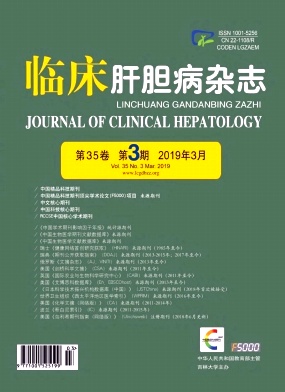|
[1] JEMAL A, BRAY F, CENTER MM, et al. Global cancer statis-tics[J]. Ca Cancer J Clin, 2015, 61 (2) :69-90.
|
|
[2] PAGE AJ, COSGROVE DC, PHILOSOPHE B, et al. Hepato-cellular carcinoma:Diagnosis, management, and prognosis[J]. Surg Oncol Clin N Am, 2014, 23 (2) :289-311.
|
|
[3] ZHAO CH, ZHOU WF, CHEN WH, et al. Clinical significanceofα-fetoprotein in initial diagnosis of primary hepatic cancer[J]. J Clin Hepatol, 2013, 29 (9) :698-701. (in Chinese) 赵春华, 周文峰, 陈维华, 等.甲胎蛋白在原发性肝癌首诊中的价值[J].临床肝胆病杂志, 2013, 29 (9) :698-701.
|
|
[4] ZHANG XF, QI X, MENG B, et al. Prognosis evaluation in al-pha-fetoprotein negative hepatocellular carcinoma after hepa-tectomy:Comparison of five staging systems[J]. Eur J SurgOncol, 2010, 36 (8) :718-724.
|
|
[5] QI J, GAO ZQ, LIU SC, et al. Value of magnetic resonancediffusion-weighted imaging combined with serum tumor mark-ers in the diagnosis of early primary hepatocellular carcinoma[J]. Chin J Med Offic, 2018, 46 (9) :1057-1058. (in Chi-nese) 齐杰, 高战强, 刘树昌, 等.磁共振扩散加权成像联合血清肿瘤标志物对诊断早期原发性肝癌价值分析[J].临床军医杂志, 2018, 46 (9) :1057-1058.
|
|
[6] ZHOU JG, YAN T, BI XY, et al. Evaluation of seven differentstaging systems for alpha-fetoprotein expression in hepato-cellular carcinoma after hepatectomy[J]. Tumour Biol, 2013, 34 (2) :1061-1070.
|
|
[7] SINN DH, YI J, CHOI MS, et al. Serum alpha-fetoproteinmay have a significant role in the surveillance of hepatocellularcarcinoma in hepatitis B endemic areas[J]. Hepatogastroen-terology, 2015, 62 (138) :327-332.
|
|
[8] BI XY, YAN T, ZHAO H, et al. Correlation of alpha fetoproteinwith the prognosis of hepatocellular carcinoma after hepatecto-my in an ethnic Chinese population[J]. Natl Med J China, 2014, 94 (34) :2645-2649. (in Chinese) 毕新宇, 阎涛, 赵宏, 等.甲胎蛋白水平与肝细胞癌预后的相关性分析[J].中华医学杂志, 2014, 94 (34) :2645-2649.
|
|
[9] MEGURO M, MIZUGUCHI T, NISHIDATE T, et al. Prognosticroles of preoperativeα-fetoprotein and des-γ-carboxy pro-thrombin in hepatocellular carcinoma patients[J]. World JGastroenterol, 2015, 21 (16) :4933-4945.
|
|
[10] AN LS, RONG WQ, WANG LM, et al. Analysis of clinicoptahological features and prognosis between alpha-fetopor teinnegatvie and positive hepaotcellular carcinoma patients afterR0 radical hepatectomy[J]. Chin J Oncol, 2015, 37 (4) :308-311. (in Chinese) 安松林, 荣维淇, 王黎明, 等.甲胎蛋白阴性和甲胎蛋白阳性肝细胞癌临床病理特征及R0切除后生存分析[J].中华肿瘤杂志, 2015, 37 (4) :308-311.
|
|
[11] YANG Z, WANG JL, SHANG RZ, et al. Correlation betweenpreoperative serum alpha-fetoprotein (AFP) level and earlyrecurrence of patients with hepatocellular carcinoma after par-tial hepatectomy[J]. Chin J Hepatobiliary Surg, 2018, 24 (3) :179-183. (in Chinese) 杨针, 汪建林, 尚润泽, 等.术前血清甲胎蛋白水平与肝细胞癌术后患者早期复发的相关性分析[J].中华肝胆外科杂志, 2018, 24 (3) :179-183.
|
|
[12] LIU HJ, BAO CM, BAI WL, et al. Risk factors for infectiouscomplications in primary liver cancer[J]. J Clin Hepatol, 2018, 34 (5) :1033-1037. (in Chinese) 刘洪金, 鲍春梅, 白文林, 等.原发性肝癌发生感染性并发症的危险因素分析[J].临床肝胆病杂志, 2018, 34 (5) :1033-1037.
|
|
[13] LI P, WANG SS, LIU H, et al. Elevated serum alpha fetopro-tein levels promote pathological progression of hepatocellularcarcinoma[J]. World J Gastroenterol, 2011, 17 (41) :4563-4571.
|
|
[14] UM SH, MUHALL C, ALISA A, et al. Alpha-fetoprotein im-pairs APC function and induces their apoptosis[J]. J Immu-nol, 2004, 173 (3) :1772-1778.
|
|
[15] ADDISSIE BD, ROBERTS LR. Classification and staging of hepa-tocellular carcinoma:An aid to clinical decision-making[J]. ClinLiver Dis, 2015, 19 (2) :277-294.
|
|
[16] WALLACE MC, KNUIMAN M, HUANG Y, et al. The prognos-tic ability of major hepatocellular carcinoma staging systems isimproved by including a treatment variable[J]. Dig Dis Sci, 2018, 63 (9) :2277-2284.
|
|
[17] EDGE, SB, COMPTON CC. The American Joint Committee oncancer:The 7th Edition of the AJCC Cancer Staging Manua-land the Future of TNM[J]. Ann Surg Oncol, 2010, 17 (6) :1471-1474.
|
|
[18] LIU LG, YANG ZY. Disputes on Barcelona staging of hepato-cellular carcinoma and its surgical strategy[J]. Int J Surg, 2016, 43 (4) :224-227. (in Chinese) 刘立国, 杨志英.肝细胞癌的巴塞罗那分期及其外科策略的争议[J].国际外科学杂志, 2016, 43 (4) :224-227.
|
|
[19] YANG T, ZHANG J, LU JH, et al. A new staging system forresectable hepatocellular carcinoma:Comparison with six ex-isting staging systems in a large Chinese cohort[J]. J CancerRes Clin Oncol, 2011, 137 (5) :739-750.
|
|
[20] AJAGY D. Staging of hepatocellular carcinoma[J]. J Clin Ex-perimental Hepatol, 2014, 4 (3) :s74-s79.
|







 DownLoad:
DownLoad: